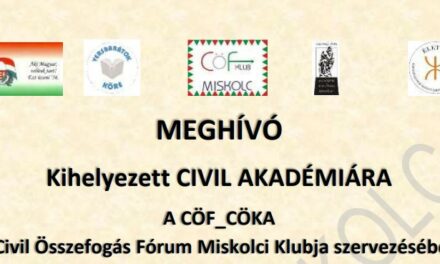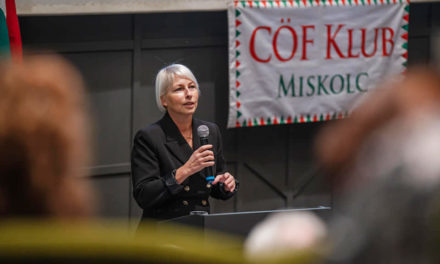There is no fratricidal war going on in Ukraine, and nothing will be the same as it was before February 24, says Liliána Grexa, who is an advocate of Ukrainian nationality in the Hungarian Parliament. The half-transylvanian Hungarian advocate thanks and asks for God's blessing on the Hungarians helping the Ukrainians.
Liliána Grexa was born in Ukraine and has lived in Hungary since she was one year old.
His father is a Hungarian of Transylvanian origin, and his mother is from Western Ukraine, so both Hungarian and Ukrainian language and culture, as well as traditions, played a big role in their family. From 2019, he is the chairman of the Youth and Media Committee of the Ukrainian National Self-Government. He takes an active role in Ukrainian national public life because he wants to pass on to the next generation the community experience he received as a Ukrainian national living in Hungary. In response to the current situation, together with the National Széchenyi Library and Móra Publishing House, the Nova Hvylja Association, which he leads, published a storybook in Ukrainian
"We pray every day, masses in Ukrainian have become regular in Hungary"
When asked what thoughts and emotions accumulated in the Ukrainian diaspora in Hungary during the war, he answers that a war deeply affects everyone, regardless of nationality. The first day of the war may have been a day of shock and worry among the Ukrainians living in Hungary, and everyone called their relatives living in Ukraine, but in addition to the worry, action and the will to do something immediately appeared.
"From day one, the Hungarian Ukrainian Greek Catholic Church Foundation set up a volunteer center, which is still operating, and in addition to church volunteers, our Associations are all working to help refugee families in some way in terms of education, accommodation, and job search. We pray for Ukraine every day in Budapest under the leadership of the Greek-Catholic Ukrainian father, but also in the countryside, in the cities where more Ukrainians live, masses in Ukrainian have become regular. We believe that where people can no longer help, prayer and the Good Lord will," says Liliána.
The Hungarian woman of Ukrainian origin tells harrowing stories about what she heard from the refugees: "When an 8-year-old girl starts telling the story that they spent 20 days in the basement, they couldn't even come out, and then they traveled with her grandmother for 4 days because her mother died, and his father is fighting at the front... then it's hard to speak up, it's hard to say anything."
Liliána says: tragedy is the fate of all people who were forced to flee from war or were buffeted by the winds of war; and it is especially painful that children also become victims of this heartbreaking, tragic situation, both mentally and physically.
What will be the future of refugees? In what proportion do they want to settle, learn the language, and work in Hungary? "Many, many people want to return to their home, to their homeland. It's just a question of when they can do this and if they will still have their home. Some people stay in Hungary because they expect to be able to return to Ukraine as soon as possible, and therefore do not want to go further from their homeland. However, despite Hungarian assistance, they have a very difficult time. Not only because of the traumas they experienced, but also because they don't know how long the war will last, they are in constant uncertainty, and meanwhile they see and hear the news about the destruction and the dead."
Regarding the problems, Liliána emphasizes that there are also language difficulties, since the Hungarian and Ukrainian languages are quite far from each other, so many people fled to a Slavic-speaking country from the start. However, he adds, those whom he met at home, they are all very grateful to Hungary, to the Hungarian people, for helping them so selflessly from the very first days.
Liliana has her own opinion about the fact that Hungary does not transport weapons across the common border and does not stop the purchase of Russian gas, as well as about the style of the Ukrainian government's reaction to all this: According to her, politics and political communication are separate professions, you could say separate genre, and politicians have been using various means of persuasion for centuries, in addition to having to represent the will of their constituents. This is compounded by the fact that there is currently a hybrid war going on in addition to the traditional one, which is why many things do not appear on the Internet as they were actually said, he says.
The full Mandiner article can be read here,
Author: Gergő Kovács
Image: Mandiner












